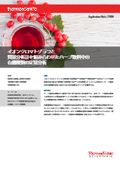Single Quadrupole Mass Spectrometer 'ISQ EC'
For those who feel uneasy about analysis that only detects electrical conductivity: Achieve high sensitivity quantification! Solve analytical problems arising from complex sample matrices!
The "ISQ EC" is a single quadrupole mass spectrometer designed with ease of use in mind. When incorporating mass spectrometry (MS), it provides many advantages while resolving the complexities that arise. It can be seamlessly connected to your IC or LC systems, allowing for easy and quick system usage. By combining IC or LC with MS, it achieves high sensitivity and accurate quantification through improved selectivity, as well as reducing false negatives and false positives by confirming the spectra of chromatographic peaks. 【Features】 ■ High sensitivity and more accurate quantification ■ Confirmation of mass peaks in chromatography, eliminating false negatives and false positives ■ Improved specificity ■ Enhanced resolution for analytes in complex matrices ■ Familiar software interface *For more details, please refer to the PDF materials or feel free to contact us.
basic information
[Examples of Analysis Combining Mass Spectrometry with IC and LC] ■Detection of common organic acids using a compact ion chromatography system and mass spectrometer ■Detection of inorganic cations and low molecular weight amines in degraded grape juice samples using IC-MS ■Detection of inorganic cations and low molecular weight amines in degraded cranberry juice samples using IC-MS ■Detection of inorganic cations and low molecular weight amines in fresh green tea and green tea samples aged for several days after extraction using IC-MS ■Detection of inorganic cations and low molecular weight amines in groundwater samples using IC-MS ■Detection of oxyhalides using a combination of a compact ion chromatography system and mass spectrometer ■Detection of common inorganic anions using a combination of a compact ion chromatography system and single quadrupole mass spectrometer *For more details, please refer to the PDF document or feel free to contact us.
Price range
Delivery Time
Applications/Examples of results
For more details, please refer to the PDF document or feel free to contact us.
Related Videos
catalog(5)
Download All Catalogs
News about this product(2)
-

Food Analysis Webinar Series [Part 3]
The third installment of the Food Analysis Webinar Series will feature a presentation by Mr. Noriyuki Tachibana from the Japan Food Inspection Foundation on "Simultaneous Analysis Method for Highly Polar Pesticides Using IC-HRMS." Many of the residue analysis methods for highly polar pesticides in our country were developed quite some time ago, often using environmentally harmful organic solvents or involving complicated pre-treatments such as derivatization and solid-phase extraction, requiring the use of different measurement instruments depending on the analysis items. To move away from such resource-intensive residue analysis, we will introduce a simultaneous analysis method for highly polar pesticides using the developed Ion Chromatography High-Resolution Mass Spectrometer (IC-HRMS). Don’t miss this valuable opportunity! In this seminar series, we will present application examples in the food sector using various chromatography techniques (LC, LC/MS, GC/MS, IC/MS) for a wide range of analytical purposes. This content will be particularly useful for those who feel limited by existing methods or are aiming to improve operational efficiency, so please be sure to watch.
-

[Free Registration] IC e-learning Renewal Launch *You can easily learn technical information online!
We are pleased to announce that our e-learning program on Ion Chromatography (IC) has been renewed with new content and technical information. It has been transformed into an e-learning platform that meets our customers' needs, whether they are unable to attend seminars due to distance, want to learn casually in their spare time, or wish to review foundational knowledge they feel hesitant to ask about. IC is a widely used analytical method for analyzing ionic species across various fields and is a popular analytical technique. The IC content focuses on the fundamentals of analysis and detection methods, while the IC-MS content is organized by themes specific to different fields, allowing learners to study methods and applications tailored to their objectives. It is available for free, so please take advantage of it.
Recommended products
Distributors
Thermo Fisher Scientific K.K., the Japanese subsidiary of Thermo Fisher Scientific Incorporated, is a sales company for comprehensive system analysis instruments, bio-related equipment, and research reagents. In Japan, it has bases in Yokohama, Tokyo, Osaka, Fukuoka, and Nagoya, handling various analytical instruments including mass spectrometers, various bio-related equipment, measuring instruments, medical devices, lab software, and research reagents.

















































